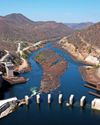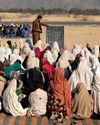
In mid-June, Giorgia Meloni was in an exultant mood while hosting the G7 summit, a gathering of the world's most powerful nations, in the southern Italian region of Apulia.
After days in which she presided over meetings speaking English, French and Spanish along with her native Italian, one evening she danced the pizzica - a traditional Apulian dance - twirling and hopping to the trance-like rhythmic folk music often played at local weddings at a contagious 100 beats per minute.
Meloni's uninhibited performance expressed the self-confidence of an emerging political star, who, after a strong showing in the European elections just a few days earlier, was the hottest political leader in Europe. She took a selfie with Indian strongman Narendra Modi, which she posted on Instagram to her 3.5 million followers with the caption: "Hello from the MELODI team." For a politician who only a few years ago was stuck at the margins of Italian politics as the head of a small rightwing party, Brothers of Italy, Meloni, at 47, appeared to be on top of the world.
Meloni has worked hard to achieve the respectability that has eluded other rightwing parties such as Marine Le Pen's National Rally. She was received at the White House by Joe Biden and has been accepted by centrist parties within the EU. This is all the more surprising given the openly neo-fascist origins of her career. (Just before she was elected prime minister in late 2022, author Roberto Saviano wrote in the Guardian: "Giorgia Meloni is a danger to Italy and the rest of Europe.") But in two years, she has surprised many people by her political pragmatism and shrewd ability.
This story is from the {{IssueName}} edition of {{MagazineName}}.
Start your 7-day Magzter GOLD free trial to access thousands of curated premium stories, and 9,000+ magazines and newspapers.
Already a subscriber ? Sign In
This story is from the {{IssueName}} edition of {{MagazineName}}.
Start your 7-day Magzter GOLD free trial to access thousands of curated premium stories, and 9,000+ magazines and newspapers.
Already a subscriber? Sign In

Friendship interrupted
They were best mates. Then one had a baby, while the other struggled to conceive. They share their brutally honest takes on what happens when motherhood affects friendship

KERNELS OF HOPE
During the siege of Leningrad, botanists in charge of an irreplaceable seed collection, the first of its kind, had to protect it from fire, rodents-and hunger

A new horizon' The inverse link between cancer and dementia
Scientists have long been aware of a curious connection between these common and feared diseases. At last, a clearer picture is emerging

Across the universe
Samantha Harvey won the Booker prize with a novel set in space. Yet, she says, Orbital is actually 'a celebration of Earth's beauty with a pang of loss'

Frank Auerbach 1931 -2024
Saved from the Holocaust, this artist captured the devastation of postwar Britain as ifits wounds were his own but he ultimately found salvation in painting

Seven lessons I've learned after 28 years as economics editor
Margaret Thatcher was Britain's prime minister and Neil Kinnock was leader of the Labour party.

Droughtstricken dam leaves economies powerless
A ll is not well with the waters of Lake Kariba, the world's human-made lake largest A punishing drought has drained the huge reservoir close to record lows, raising the prospect that the Kariba Dam, which powers the economies of Zambia and Zimbabwe, may have to shut down for the first time in its 65-year history.

Let this be the end of these excruciating celebrity endorsements
I wish celebrities would learn the art of the French exit. But they can't, which is why Eva Longoria has announced she no longer lives in America. \"I get to escape and go somewhere,\" she explained.

Alive, but unable to thrive under absolute patriarchy
Since the Taliban returned to power, women and girls have tried defiance, but despair at their harshly restricted lives

‘It's tragic’ Reflection in the wake of Amsterdam violence
Carrying signs scrawled with messages urging unity, they laid white roses at the statue of Anne Frank, steps away from the home where her family had hidden from Nazi persecution.